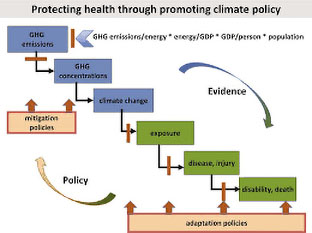Global Climate Change
Turning Knowledge Into Action
The science of climate change is a complex subject that balances the physical record and scientific fact with politics, policy, and ethics – and is of particular importance to the geosciences. This thoughtfully crafted new text and accompanying media encourage non-science majors to practice critical thinking, analysis, and discourse about climate change themes. Taking a cross-disciplinary approach, acclaimed educator and researcher, David Kitchen, examines not only the physical science, but the social, economic, political, energy, and environmental issues surrounding climate change. His goal: to turn knowledge into action, equipping students with the knowledge and critical skills to make informed decisions, separate facts from fiction, and participate in the public debate.
Understanding Global Climate Change
Modelling the Climatic System and Human Impacts
By Arthur P Cracknell, Costas A Varotsos
Climate change, a familiar term today, is far more than just global warming due to atmospheric greenhouse gases including CO2. In order to understand the nature of climate change, it is necessary to consider the whole climatic system, its complexity, and the ways in which natural and anthropogenic activities act and influence that system and the environment. Over the past 20 years since the first edition of Understanding Global Climate Change was published, not only has the availability of climate-related data and computer modelling changed, but our perceptions of it and its impact have changed as well. Using a combination of ground data, satellite data, and human impacts, this second edition discusses the state of climate research today, on a global scale, and establishes a background for future discussions on climate change. This book is an essential reference text, relevant to any and all who study climate and climate change.
Climate Change and Agriculture
Edited By Delphine Deryng
in Climate change and agriculture
It has been suggested that agriculture may account for up to 24% of the greenhouse gas emissions (GHGs) contributing to climate change. At the same time climate change is threatening to disrupt agricultural production. This collection reviews key research addressing this challenge.
Climate change is the biggest challenge agriculture faces. Part 1 of this collection reviews current research on the impacts of climate change on agriculture, such as the effects of increased temperatures, as well as the ways these impacts can be modelled. Part 2 assesses what we know about the contribution of agriculture to climate change, including the impacts of both crop and livestock production as well as land use. Part 3 surveys mitigation strategies to achieve a more ‘climate-smart’ agriculture such as the role of integrated crop-livestock and agroforestry systems.
Climate policy co-benefits: a review
Published in Climate Policy
Concern over mitigation costs impedes the adoption of the climate policies needed to achieve agreed global warming targets. While costs are important to consider, so are benefits. However, the evidence for climate policy co-benefits, that is, the benefits in addition to avoided climate change costs, is commonly overlooked in policy-making. In many areas, the research is limited and not comprehensively synthesised.
Green bargains: leveraging public investment to advance climate regulation
Published in Climate Policy
Climate policy has entered a new era as public investment is increasingly moving to center stage, including recovery spending and long-term climate investment plans. While essential for decarbonization, public investment is not enough – the carrots of investment need to go hand in hand with regulatory sticks.
The role of populist attitudes in explaining climate change skepticism and support for environmental protection
Published in Environmental Politics
Conventional wisdom holds that partisanship and political ideology, writ large, are some of the most powerful explanations of attitudes towards climate change and environmental politics. While compelling, most studies focus on a narrow definition of political ideology in the US. This study adds to the literature by assessing the relationship between populism, climate skepticism, and support for environmental protection. Populism offers an orthogonal dimension to partisanship and left-right self-placement, which broadens the scope of the concept.
 China
China  Africa
Africa 

